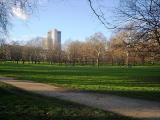
Disagreements have emerged within the Swiss parliament regarding the frozen Russian assets, a consequence of international sanctions on Moscow.
A Senate commission has dismissed a set of motions from the House of Representatives, which urged the Swiss government to enable Ukraine to utilize these funds for reconstruction purposes.
The House of Representatives had previously endorsed similar motions last September, supported by all political factions except the Swiss People’s Party. These motions proposed allocating the frozen assets of the Russian state and associated entities as reparations to Ukraine. The Federal Council, in favor of this proposition, was expected to establish requisite legal frameworks at the international level.
Switzerland has frozen approximately CHF 7.7 billion in financial assets belonging to Russians due to the West's sanctions. The freezing of these assets spans private individuals, the Russian state, and closely affiliated entities. Lawmakers from both the left and right wings argue for the allocation of these funds as reparations for Ukraine, given the evident link between the aggressor and the owner of the funds—the Russian state itself.
However, the Senate's Legal Affairs Commission contends that state assets are generally shielded by state immunity, a protection ensured under international law. Moreover, Switzerland is actively engaged in multiple forums to resolve reparations issues in compliance with international law.
Consequently, the Senate commission deems the House of Representatives' motions to offer little value and potentially restrict the government's flexibility in foreign policy matters. The decision was reached by a majority vote of 7 to 5 within the commission, as per a Tuesday press release.
Nevertheless, a minority within the commission views the adoption of these motions as signaling the government to persist in its active pursuit of a solution aligned with international legal frameworks. Photo by Futbol vic, Wikimedia commons.







































